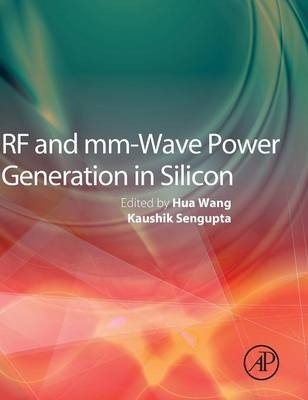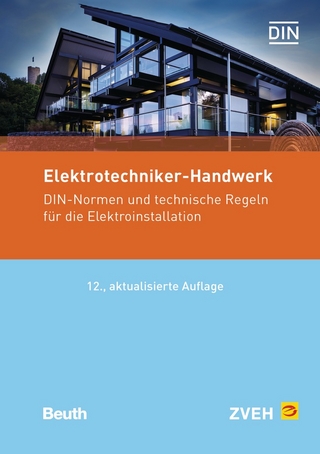
RF and mm-Wave Power Generation in Silicon
Academic Press Inc (Verlag)
978-0-12-408052-2 (ISBN)
With this book you will learn:
Power amplifier design fundamentals and methodologies
Latest advances in silicon-based RF power amplifier architectures and designs and their integration in wireless communication systems
State-of-the-art mm-Wave/THz power amplifier and power generation circuits and systems in silicon
Hua Wang Hua Wang (M’05?SM’15) received his B.S. degree from Tsinghua University, Beijing, China, in 2003, and M.S. and Ph.D. degrees in electrical engineering from the California Institute of Technology, Pasadena, in 2007 and 2009, respectively. He was with Guidant Corporation during the summer of 2004, working on accelerometer-based posture monitoring systems for implantable biomedical devices. In 2010, he joined Intel Corporation, where he worked on the next generation energy-efficient mm-wave communication link and broadband CMOS Front-End-Module for Wi-Fi systems. In 2011, he joined Skyworks Solutions. His work at Skyworks included the development of SAW-less integrated filter solutions for low-cost cellular-standard Front-End-Module. In 2012, he joined the School of Electrical and Computer Engineering at Georgia Institute of Technology as an assistant professor. He currently holds the Demetrius T. Paris Junior Professorship of the School of Electrical and Computer Engineering. He is generally interested in innovating mixed-signal, RF, and mm-Wave integrated circuits and systems for communication, radar, and bioelectronics applications. Dr. Wang received National Science Foundation (NSF) CAREER Award in 2015, Roger P. Webb ECE Outstanding Junior Faculty Member Award in 2015, and Lockheed Martin Dean’s Excellence in Teaching Award in 2015. He was the award recipient of the 46th IEEE DAC/ISSCC Student Design Contest Winner in 2009 based on his work of “An Ultrasensitive CMOS Magnetic Biosensor Array for Point-Of-Care (POC) Microarray Application. He was also a co-recipient of the IEEE Radio Frequency Integrated Circuits Symposium (RFIC) Best Student Paper Award (1st Place) as the students’ Ph.D. advisor in 2014. Dr. Wang is an Associate Editor of the IEEE Microwave and Wireless Components Letters (MWCL). He is currently a Technical Program Committee (TPC) Member for IEEE Radio Frequency Integrated Circuits Symposium (RFIC), IEEE Custom Integrated Circuits Conference (CICC), IEEE Biopolar/BiCMOS Circuits and Technology Meeting (BCTM), and IEEE/CAS-EMB Biomedical Circuits and Systems Conference (BioCAS). He serves as the Chair of the Atlanta’s IEEE CAS/SSCS joint chapter, which won the IEEE SSCS Outstanding Chapter Award in 2014. Kaushik Sengupta Kaushik Sengupta (M’12) received the B.Tech. and M.Tech. degrees in electronics and electrical communication engineering from the Indian Institute of Technology (IIT), Kharagpur, India, both in 2007, and the M.S. and Ph.D. degrees in electrical engineering from the California Institute of Technology, Pasadena, CA, USA, in 2008 and 2012, respectively. In February 2013, he joined the faculty of the Department of Electrical Engineering, Princeton University, Princeton, NJ, USA. During his undergraduate studies, in the summers of 2005 and 2006, he performed research at the University of Southern California and the Massachusetts Institute of Technology (MIT), where he was involved with nonlinear integrated systems for high-purity signal generation and low-power RF identification (RFID) tags, respectively. His research interests are in the areas of high-frequency integrated circuits (ICs), electromagnetics, optics for various applications in sensing, imaging, and high-speed communication. Dr. Sengupta was the recipient of the IBM Ph.D. fellowship (2011–2012), the IEEE Solid-State Circuits Society Predoctoral Achievement Award (2012), the IEEE Microwave Theory and Techniques Graduate Fellowship (2012), and the Analog Devices Outstanding Student Designer Award (2011). He was the recipient of the Charles Wilts Prize in 2013 from Electrical Engineering, Caltech for outstanding independent research in electrical engineering leading to a PhD. He was also the recipient of the Prime Minister Gold Medal Award of IIT (2007), the Caltech Institute Fellowship, the Most Innovative Student Project Award of the Indian National Academy of Engineering (2007), and the IEEE Microwave Theory and Techniques Undergraduate Fellowship (2006). He serves on the Technical Program Committee of the European Solid-State Circuits Conference (ESSCIRC). He was selected in “Princeton Engineering Commendation List for Outstanding Teaching in 2014. He was the co-recipient of the IEEE RFIC Symposium Best Student Paper Award in 2012 and 2015 IEEE Microwave Theory and Techniques Society (IEEE MTT-S) Microwave Prize.
1. Introduction
Part I: Power amplifier design methodologies 2. Power amplifier fundamentals
Part II: RF Power Amplifier Design Examples 3. CMOS power amplifier design for wireless connectivity applications: A highly linear WLAN power amplifier in advanced SoC CMOS 4. CMOS power amplifier design for cellular applications: An EDGE/GSM dual-mode quad-band PA in 0.18 µm CMOS 5. Energy-efficiency enhancement and linear amplifications: A transformer-based Doherty approach 6. Linear power amplification with high back-off efficiency: An out-phasing approach 7. Energy efficiency enhancement and linear amplifications: An envelope-tracking (ET) approach 8. A digital RF power amplification technique based on the switched-capacitor circuit 9. A transformer-based reconfigurable digital polar Doherty power amplifier fully integrated in bulk CMOS
Part III: mm-Wave and Terahertz Power Generation Design Examples 10. 60Â GHz all silicon radio IC: How it all started 11. mm-Wave power-combining architectures: Current combining 12. mm-Wave power-combining architectures: Hybrid combining 13. mm-Wave CMOS design above 60Â GHz 14. Self-healing techniques for robust mm-Wave power amplification 15. mm-Wave class-E PA design in CMOS 16. High-speed, efficient, mm-Wave power-mixer-based digital transmitters 17. THz power generation beyond transistor fmax 18. THz signal generation, radiation, and beam-forming in silicon: A circuit and electromagnetics co-design approach 19. Silicon-based THz signal generation with multiphase subharmonic injection-locking oscillators
| Erscheint lt. Verlag | 4.12.2015 |
|---|---|
| Verlagsort | San Diego |
| Sprache | englisch |
| Maße | 191 x 235 mm |
| Gewicht | 1340 g |
| Themenwelt | Technik ► Elektrotechnik / Energietechnik |
| Technik ► Nachrichtentechnik | |
| ISBN-10 | 0-12-408052-9 / 0124080529 |
| ISBN-13 | 978-0-12-408052-2 / 9780124080522 |
| Zustand | Neuware |
| Haben Sie eine Frage zum Produkt? |
aus dem Bereich


